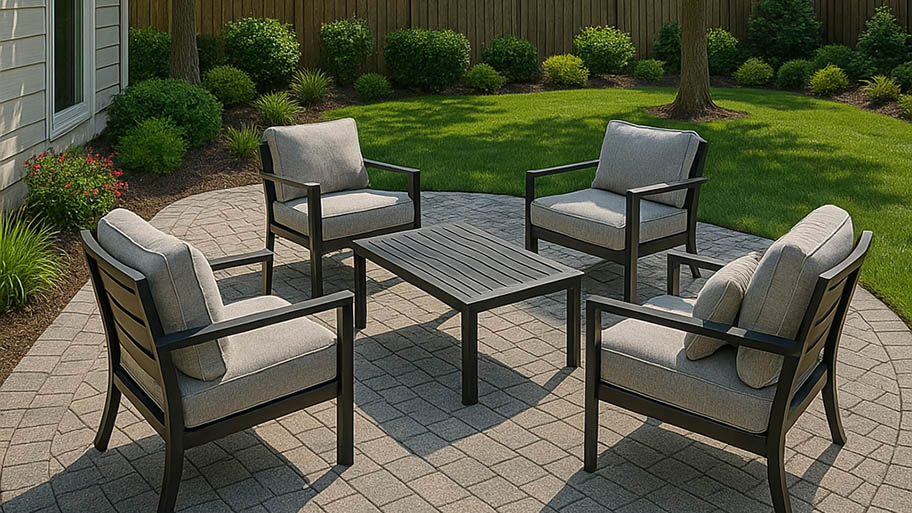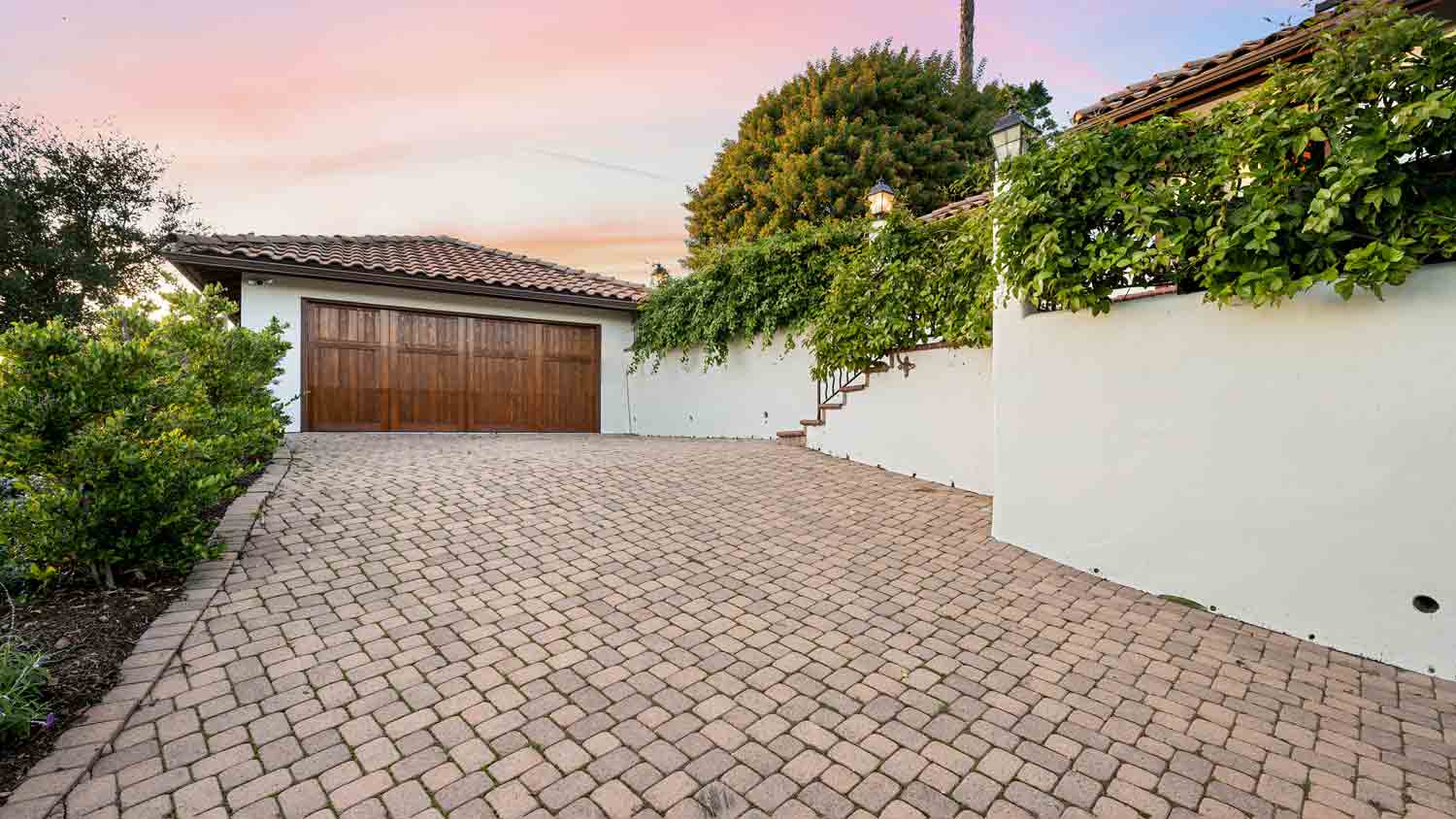
The cost of stone steps can vary considerably depending on the material you choose and how much labor is required. This guide shows you the cost of popular stone steps and all the extra fees you need to consider when tackling this project.
Pavers and hardscaping service costs depend on your project and location. Check with a local pro for your specific job.
Wall size, type, and site conditions are key concrete retaining wall cost drivers, with prices affected by wall height, length, and accessibility.
Concrete retaining walls provide crucial structural support and erosion control for sloped or unstable landscapes.
Expect to pay $20 to $60 per square foot to build a concrete retaining wall.
Professional installation labor costs average between $40 and $100 per hour.
Professional installation ensures your wall is safe, code-compliant, and built for long-term durability.
This article was created using automation technology and thoroughly fact-checked and edited by an Angi Editor in accordance with our AI policy.
A concrete retaining wall is a lasting investment in your home’s stability and curb appeal. Concrete retaining wall costs average $5,200 nationwide, with most homeowners paying between $3,600 and $9,000 for installation on average. Prices range from $20 to $60 per square foot, depending on wall height, length, and complexity. Understanding these costs helps you budget and plan your project effectively.
Labor often accounts for $40 to $100 per hour, and the final price reflects the scope of your project and local market rates.
Several key factors influence the cost of installing a concrete retaining wall. Understanding these helps you anticipate expenses and prioritize features.
The size of your concrete retaining wall is the single biggest factor affecting total project cost. Both wall height and wall length play a direct role in determining how much material, labor, and engineering expertise you will need. Most residential retaining walls range from two to eight feet high and 20 to over 100 feet long.
Taller or longer walls require more concrete, reinforcement, and time to install, which increases your price. If your project calls for a particularly tall or lengthy wall, you may also need additional engineering and permits. For most homes, a minimum wall height of two feet is common, while eight feet is a practical maximum for residential properties without complex structural requirements.
Here are the costs associated with various-sized concrete retaining walls, based on an average cost range of $20 to $60 per square foot.
| Height x Length (Ft.) | Sq. Footage | Average Cost | Cost Range | Description |
|---|---|---|---|---|
| 2x20 | 40 | $1,600 | $800–$2,400 | Small garden or border wall |
| 4x40 | 160 | $6,400 | $3,200–$9,600 | Typical residential project |
| 6x60 | 360 | $14,400 | $7,200–$21,600 | Large yard or significant slope |
| 8x100 | 800 | $32,000 | $16,000–$48,000 | Extensive structural wall |
Choosing the right type of concrete retaining wall impacts both cost and performance. The main types include poured-in-place concrete, precast panels, interlocking concrete blocks, and large concrete blocks. Each has its own price point, installation process, and suitability for different site conditions.
Poured-in-place walls offer maximum strength and customization but often cost more due to labor and formwork. Precast panels speed up installation and provide uniform finishes. Interlocking concrete blocks are DIY-friendly and affordable, while large concrete blocks are best for heavy-duty or commercial applications.
| Wall Type | Description | Average Cost per St. Ft. | Pros | Cons |
|---|---|---|---|---|
| Poured-in-place | Custom-formed concrete, built on site | $20–$45 | Strong, seamless, customizable | Labor-intensive, costly |
| Precast panels | Factory-made panels, craned in place | $25–$40 | Fast install, uniform look | Limited customization |
| Interlocking concrete blocks | Modular, stacked blocks | $15–$35 | DIY-friendly, flexible design | Not as strong as poured |
| Large concrete blocks | Oversized, heavy-duty blocks | $20–$45 | Very sturdy, fast placement | Requires equipment |
Labor is a significant portion of concrete retaining wall costs. Most retaining wall contractors charge $40 to $100 per hour, or $10 to $30 per square foot for standard projects. Installations involve general contractors, masons, and sometimes structural engineers, especially for tall or complex walls.
Minimum service fees often apply for small jobs, while larger or more intricate projects require more labor hours and specialized expertise. Labor costs are higher in regions with strong demand or union labor, and increase for walls with complex designs or difficult site access.
Most municipalities require permits for retaining walls above a certain height, often three or four feet. Permit fees can range from $25 to $450, depending on your location and wall size. Some areas also require inspection fees or engineering plans to ensure code compliance. The permitting process can take several days to a few weeks, so plan ahead to avoid delays.
Where you live affects your concrete retaining wall cost due to regional differences in labor rates, material pricing, and local demand. Urban areas tend to have higher labor costs than rural regions, while local climate can affect material choices and installation timing.
Site-specific factors also play a role. Walls built on steep slopes, near existing structures, or in hard-to-access locations may require more work and specialized equipment, driving up costs.
Integrated features like stairs, lighting, railings, planters, or seating will add to your total, depending on complexity and materials. Custom designs raise the price due to added labor and materials. Other add-on features include:
Drainage: Adding drainage systems, such as French drains or weep holes, costs $10 to $80 per linear foot, but is critical to prevent water pressure and wall failure.
Reinforcements: Rebar or geogrid add $1 to $5 per square foot.
Decorative finishes: Stamped, stained, or textured concrete can increase your cost by $5 to $15 per square foot.
When planning your concrete retaining wall project, take the following factors into consideration:
Site complexity, such as steep slopes, poor soil stability, or limited equipment access, increases labor and material costs.
Site preparation, including excavation, adds $100 to $220 per cubic yard or more.
Delivery fees for concrete, blocks, or equipment can range from $100 to $500.
Post-construction cleanup and debris removal can add $6 to $15 per square foot.
Custom or tall walls may require design or structural engineering fees of $100 to $220 per hour.
Several ongoing costs associated with concrete retaining walls are important to factor into your budget.
Many contractors offer warranties covering materials and workmanship, often lasting one to five years. Manufacturer warranties on concrete blocks can extend longer. Extended or premium warranties add to your project but provide additional peace of mind.
If your wall includes integrated drainage, plan for occasional repairs or cleaning. Utility costs apply if you install lighting or irrigation systems.
Routine maintenance—such as cleaning, sealing, and periodic inspections—helps preserve your wall. Occasional repairs, like crack sealing or fixing drainage, may cost $100 to $1,500, depending on the issue.
Sales tax on materials and labor will apply in many states, averaging between 5% and 10%. If your wall significantly increases your home’s value, your property tax assessment could rise slightly, though this is uncommon for small to medium projects.
Large or structural retaining walls may require additional insurance coverage, especially if failure could impact neighboring properties. This could increase your homeowner’s insurance premiums. Damage from events like flooding or earthquakes may require special coverage.
You might consider building a concrete retaining wall yourself to save on labor, but there are important considerations. While it’s possible to DIY a short retaining wall, keep in mind that most areas require a structural engineer for walls over three feet high to meet code compliance, making DIY possible only for small projects.
DIY installation costs include materials, tool rental, and equipment. You will save on labor but take on the risk of mistakes, code violations, or structural issues. You’ll need strong skills, proper safety gear, and plenty of time—smaller projects can take several weekends, while larger jobs require heavy lifting and technical know-how. Common DIY mistakes include poor drainage, uneven footing, or insufficient reinforcement.
Hiring a retaining wall pro costs more upfront but covers labor, code compliance, and often comes with warranties. Pros ensure your wall is safe, durable, and meets all permit requirements—especially important for tall, complex, or load-bearing walls.
| Installation Method | Labor Cost | Pros | Cons |
|---|---|---|---|
| DIY | $0 | Lower cost | Time-consuming, risky |
| Professional | $40–$100 per hour | Warranty, structural integrity, expertise | Higher cost |
Sometimes it is possible to repair a damaged retaining wall, but in other cases, replacement is the safest choice.
Repair is an option if your wall has minor cracks, slight leaning, or small drainage issues. Replacement is necessary for severe leaning, major cracks, or widespread structural failure. Age, extent of damage, and warranty status should guide your decision. A common rule is that if repair costs are more than 50% of replacement, replacement is recommended for long-term value.
Minor repairs, such as crack filling, patching, or drainage, cost between $100 and $1,500. Full replacement, including demolition and new installation, ranges from $3,000 to $10,000 or more, but it delivers a new, structurally sound wall.
A well-built concrete retaining wall can deliver a solid return on investment (ROI), especially when walls increase usable yard space, control erosion, and boost curb appeal. Compared to other landscaping improvements, retaining walls provide a good balance of function and value.
The value added depends on your location, the wall’s visibility, the quality of materials, and thoughtful design. Benefits include improved drainage, property protection, and enhanced accessibility for sloped lots. These factors can help your home stand out if you choose to sell.
Consider these cost-saving strategies to optimize your retaining wall budget:
Get multiple quotes from qualified local retaining wall builders to compare pricing.
Choose standard designs and finishes over custom or decorative options.
Schedule installation during off-peak seasons for potential savings.
Prepare the site yourself if possible, tackling tasks such as clearing and minor excavation.
Opt for modular or interlocking block systems for easier, lower-cost installation.
Reuse or recycle existing materials when feasible.
Limit wall height and length to essential needs to control costs.
Home is the most important place on earth, which is why Angi has helped more than 150 million homeowners transform their houses into homes they adore. To help homeowners with their next project, Angi provides readers with the most accurate cost data and upholds strict editorial standards. We extensively research project costs to develop the pricing data you see, so you can make the best decisions for you and your home. We rely on reputable sources, including the U.S. Bureau of Labor Statistics, academic journals, market studies, and interviews with industry experts—all to ensure our prices reflect real-world projects.
Want to help us improve our cost data? Send us a recent project quote to [email protected]. Quotes and personal information will not be shared publicly.
From average costs to expert advice, get all the answers you need to get your job done.

The cost of stone steps can vary considerably depending on the material you choose and how much labor is required. This guide shows you the cost of popular stone steps and all the extra fees you need to consider when tackling this project.

Looking to elevate your backyard aesthetic with a patio? Use this paver patio cost guide to help you estimate your total project cost before you get started.

Porcelain pavers are a high-end option for your home’s hardscaping that can completely transform your outdoor space. Here’s how much porcelain pavers cost.

If you’re planning to install a river rock garden bed or drainage area, you’re probably wondering, “How much river rock do I need?” Here’s how to calculate it.

Choosing the right type of pavers for your hardscape can be a challenge with all the options on the market. Check out the most popular varieties to narrow down your list.

This calculator will help you estimate how many pavers you’ll need to purchase for your hardscaping project.